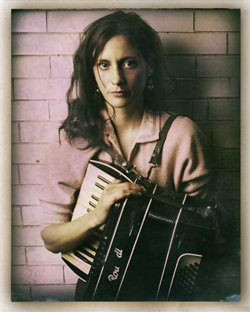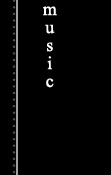




{kal cahoone} Kal Cahoone breaks my heart. In the paradox of existence, opposition oftentimes proves to be a catalyst for growth. Denver songstress, Kal Cahoone, knows this all too well: that to find one’s self, sometimes you need to go away. And instead of looking to the future for one’s evolution, sometimes one needs to confront everything in the past. Kal Cahoone is quiet. She is sweet and she will look at you with the kindest of eyes. But her music is dark. Tortured. And somehow, all of these polarities make some strong sense only when they are rolled-up into a girl that is at once precisely this complex and also that simple. In so many ways, Kal Cahoone is still feeling out the world – as a human within it, but also as a songwriter and singer. It is on account of her struggle though, to push forward and make meaning of her world, why Cahoone’s tremendously sorrowful songs possess an inherent redemptive quality: From the tone in her sad and breathy voice to the haunting piano and accordion that she plays. Everything, from the tone and timbre of her every instrument, to her black dresses – absolutely everything displayed feels as though it has a home inside Cahoone. I’m just not so sure that I am capable of housing everything that she does; or if I were able, I’m not certain that I would be standing still: I would be running. Sprinting. And maybe I am: running. This is why, in all of this complicated beauty, Kal Cahoone may be the sound of hope. My hope. Her hope. She may be the embodied representative of a heart healing and the digestion of romantic love. And while we all encounter the pain of this existence, there are some of us, like Cahoone, who possess the ability to feel that pain more. And carry it further. In hope, there is ache. In healing, there is always an element of hurt. And, as we all know, in love there is loss. With these elemental dichotomies at-hand, picture a young girl with a heavy heart arriving in Chile in her late adolescence, with only one suitcase in her hand. No plan and no real life maps. And while this isn’t the beginning to her story, this is what Kal Cahoone looks like to me. Because after Cahoone struggled through the end of her childhood so mightily, she left America – for a land wherein she only knew the language. After you envision this dark girl in a gray airport, picture her now on top of Happy Hill, the place where the famous poet Pablo Neruda lived, in Chile. This is where Kal Cahoone took up residence for three years. And while this hill was probably the most idyllic of places to begin healing – this wasn’t Cahoone’s fate. Not here anyway. Because, in a spontaneous moment of curiosity, Cahoone crossed the Andes and landed in Argentina where her walk took her straight into the arms of a boy. The boy? Nonetheless than the popular Argentian composer, Christian Basso. Immediately Cahoone and Basso began composing music together. Cahoone picked up the accordion to play, and she also began playing the piano again – for the first time since she was a child. And the couple’s output was powerful: Their work appeared in a major film. Her marriage to Basso fluttered and flickered, and with the same power that it swept her up from her feet, it also receded. Still restless and staring down the well of her past, Cahoone returned to Denver – still unresolved about her place in the world and still uncertain about the state of her heart. But upon her return, Cahoone took-up playing with Slim Cessna’s Auto Club member John Rumley. The two quickly began composing new music under the name Tarantella. With the duos Denver connections, a show was slated shortly after they began playing together. And in-line with her history, Kal Cahoone’s first show on stage, in public was a memorable one: At the Ogden Theater, opening for 16 Horsepower. In this there is the secret to Kal Cahoone: She is powerful. Testament to this is her body of work. And while Tarantella did not reap the kind of attention that the act deserved, the power in that project and the power in her subsequent solo act is evident. More than evident: it reminds you of our true microscopic, universal size. To this end, Kal Cahoone is an odd kind of stranger to fame and respect. Tarantella, still to this day, possesses a cult-like reverence around Denver. But as is the case with Slim Cessna’s Auto Club, 16 Horsepower, Wovenhand and others like Munley – the sound that is deemed “Denver’s sound” by the national media has been sparsely received, at best, by the Queen City of the Plains. In this, Cahoone is a kind of Steppenwolf. Even in person, you get the sensation that everything about her resides on the steppes – outside of city limits and social acceptance. Talking with her, she is nearly brusque in her honesty and darkness. Still, she retains a power in her cloaked sweetness. And in her songs you can hear just this diverging style of melancholy. Cahoone’s music is airy and ghostlike. In composition her songs are unpretentious but always in possession of some frightening complication that bubbles just beneath the surface. You can feel this complication. Nearly see it. In content, Cahoone seems almost obsessed with the ultimate human emotions and virtues – obsessed because she is uncomfortably learned in their power and charm; and deceit. To understand how everything around love and lost and pain has corners it; and how they are all blindingly sharp going down – one doesn’t need much more than to listen to her songs. Lyrically, most of her cathedral work is conversational and so bleeding honest and universal that one can’t help from cringing in understanding while listening. Cahoone’s time with Tarantella served as an astral learning process, just as was the case with her time with Basso. Just like her process through music and the music that she plays – in whole, Kal Cahoone feels transitory. Ethereal. But now that she is a mother and further down her human path of existence, by her own account, Cahoone feels a bit more settled. Her daily life revolves around her child and her professional work. And running parallel to this is her musical production: Now Cahoone is the sole songwriter for her act. She is making the calls. She is pushing for studio time and booking shows. She has her sights set on the future and working harder. In this, she probably hasn’t too many choices: Cahoone needs this music. It’s her journal. It’s her articulation of the spiritual. Of everything lost and everything that is still to be gained. In 2008, Cahoone will certainly have more recordings available of her sparse and intimate sound – a sound that suits her well. And one that she is nearly fully grown into. It’s a sound that is unique in its haunt. I just hope that, like our breath in these wintry days – I hope her work blossoms and expands outward and into the sunlight of a city’s open arms. Because Kal Cahoone breaks my heart. And I want her to break yours. For upcoming shows and albums, visit Kal here: www.myspace.com/kalcahoone. |









